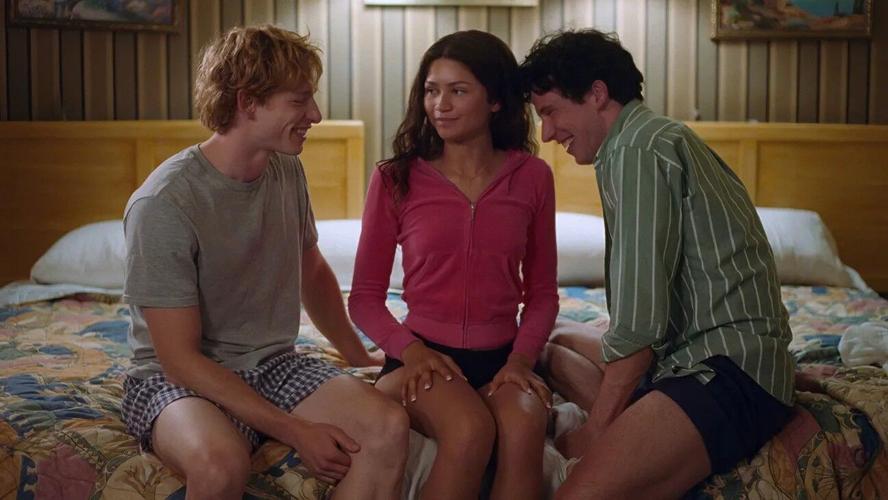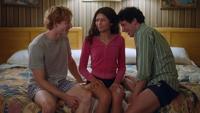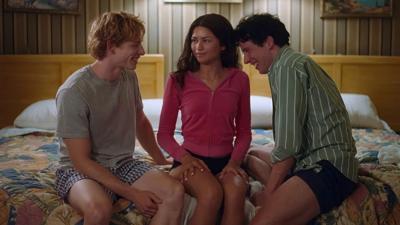Zendaya (Dune: Part Two and Spider-Man: No Way Home) stars as Tashi Duncan, a tennis player who becomes a coach and manager. This film focuses on her relationship to two other tennis players who begin to compete against each other in a romantic sense and then in a professional or athletic sense. Zendaya is the most famous person in this film, so she's the largest and main face on the poster. She gets top billing, but this film isn't really about her. She is simply a means to an end. Director Luca Guadagnino is best known for the Oscar-winning, gay romance Call Me By Your Name (2017), a film that didn't cost much to make and didn't make that much in the box office. It seems Guadagnino wanted to continue making films with that same kind of same-sex lust and desire, but he wanted more money and more mainstream appeal, so he plopped Zendaya at the center of this storm, literally. He uses her as a crutch in order to get to two boys kissing, naked and eventually embracing each other.
I don't begrudge him this plopping of Zendaya. I'm all for more portrayals and representation of queer stories or LGBTQ themed narratives. If Zendaya is merely the vessel to get us there, then I approve. Whatever crutches are necessary, I'm willing to concede, but fans of Zendaya should be forewarned that she's basically a cypher here. She's just a means to an end. She's a producer on this project and Justin Kuritzkes' screenplay likely had to be approved by her, so to be fair, she's not exploited, physically or otherwise. It's just unfortunate that her character only exists in relation to men. For example, Kuritzkes' script certainly fails the Bechdel test. For a film centering on a Black woman in a predominantly White male sport, the film doesn't comment upon it enough and mostly overlooks any racial or even socioeconomic issues or aspects that Tashi might have faced or currently faces. It doesn't really explore Tashi's outlook, perspective or experiences as a person of color in this space. She only exists as an object for the two guys either to ogle or try to impress.

Mike Faist (West Side Story) co-stars as Art Donaldson, the husband to Tashi. He's a very famous tennis player on the level of Novak Djokovic or someone of that caliber. He's famous enough that his face is on huge billboards in New York. We're led to believe that he got to such acclaim with the help of his wife, Tashi who works as his manager and coach. She seems to be very tough and fierce in how she handles things and how she handles him. She doesn't sugar-coat. She's terse and no-nonsense. He's a good player, but he seems to play better when pushed or specifically pushed by Tashi. However, he's not playing as well as he used to play. One reason might be because he's getting older. He's almost 40 or at least in his mid to late 30's and is feeling too old to still compete as hard as he might need and as Tashi might want.
In order to boost his confidence and get him back on track, Tashi gets Art to participate in a series of tennis matches in New Rochelle, matches referred to as the "ATP Challenger Tour." Not knowing much about the sport, the ATP Challenger Tour doesn't seem like the place for hugely successful professional athletes. It seems more bush league to mix a sporting metaphor. It feels like a place open to anybody or lower-level players but likely does field talented athletes. It doesn't come across, but it seems as if it's Tashi lowering the bar for Art.

Josh O'Connor (The Crown) also co-stars as Patrick Zweig. He's a competitor at the ATP Challenger Tour. He raises the bar a little bit for Art because we come to learn that Patrick and Art have known each other since they were kids and until Art went to college at Stanford University, Patrick and Art played as doubles and were the best of friends. They split up after college and in the decade or so since, the two became veritable enemies. The reason for the split is the fact that both are seemingly in love with Tashi. Art is currently married to Tashi, but we learn that Patrick dated her first and still has feelings for her.
Like a tennis ball going back-and-forth, Tashi goes from one man's bed to another's, or rather from one man's luxury hotel suite to another's car backseat. There's some intrigue that Tashi is manipulating both of them in order to get them to play tennis better. It would be like any sports film where instead of yelling and screaming in order to get a better performance, the coach dangles the promise of sex. It's like dangling a carrot or food in front of animals in order to motivate them into action, but, in this case, the carrot is having sex with Tashi. It's an intriguing angle to explore, but if this film were more about Tashi using sex to motivate players to play their best, that would be one thing.

Yet, we're meant to believe that this film is some kind of love triangle. It doesn't work because again Tashi is too much of a cypher. I'm not sure I get what her true desire is or to what she's specifically attracted. Guadagnino's camera certainly lingers on the shirtless or totally nude bodies of Art and Patrick. They're both in good shape, toned to very athletic. Like most tennis players, they're mainly skinny, essentially twinks to use gay parlance, but they're not the hottest guys ever. Typically, Hollywood would hire actors who are often better-looking than their real-life counterparts, but, in this case, I would say guys like Novak Djokovic, Andy Roddick when he was younger, James Blake or even Jo-Wilfried Tsonga are way better-looking. Here, the real guys are hotter than the Hollywood guys. All this to say, I wasn't convinced as to why Tashi would be so attracted to Art or Patrick. Even if it was only based on their talent, we're led to believe that they aren't the best tennis players who ever lived either.
However, Tashi's reasons for attraction ultimately don't matter. As mentioned, she's a crutch, a means to an end. It's not about whether Tashi is attracted to either Art or Patrick. It's about whether Art and Patrick are attracted to each other. Guadagnino is an openly gay filmmaker and the homo-eroticism is on full display. A locker room scene feels gratuitous and exists simply to underline that homo-eroticism, oozing almost out of every scene following the two of them kissing. Tashi refers to herself as a homewrecker between Art and Patrick implying they're a gay couple early on. It seems to be in jest but the subtext is that it's absolutely true.

Unfortunately, except for the one scene, which sees them kiss, the same-sex attraction between Art and Patrick is all innuendo. We see the boys together doing things like hanging out nude in a sauna. We see Patrick eating a banana or a churro in very suggestive ways. Guadagnino hits us over the head with hints, implying a queerness in one, if not both, and some kind of sexual charge between the two boys. The filmmaker also suggests an inability for them to act upon it without a female catalyst. It makes this film the very definition of sexual frustration. This would be fine, if the film bothered to explore that frustration or possible queerness within them. Yes, there's a scene where Patrick swipes right on a dating app on a guy. It's not definitive if this is an expression of his desire or just an act to find a place to sleep, being that Patrick is sleeping out of his car during the ATP Challenger Tour. If we had seen Patrick go out on a date with that dating app guy, then the film could've explored Patrick's desire, but the film instead side steps it.
Finally, for a film about tennis, and with a good amount of tennis action, this film could not make me care about the sport at all. It's not to say that Guadagnino doesn't come up with some clever or inventive camera angles. One of the first has the tennis ball flying directing into the lens. It would be great for anyone wanting a jarring 3D effect that kept taking me out of the film. It's meant to be immersive. The film also manages to get a shot that seems as if the camera is literally attached to the tennis ball. It's an immersive tactic, which could be effective. Yet, it seemed ridiculous and again jarring for how artificial it felt. What didn't feel artificial is the energy between the guys, the heat and literal sweat dripping off them. It underlined the sexual tension between them that Guadagnino either can't or won't express beyond the metaphor.

Rated R for language, some sexual content and graphic nudity.
Running Time: 2 hrs. and 11 mins.
In theaters.













